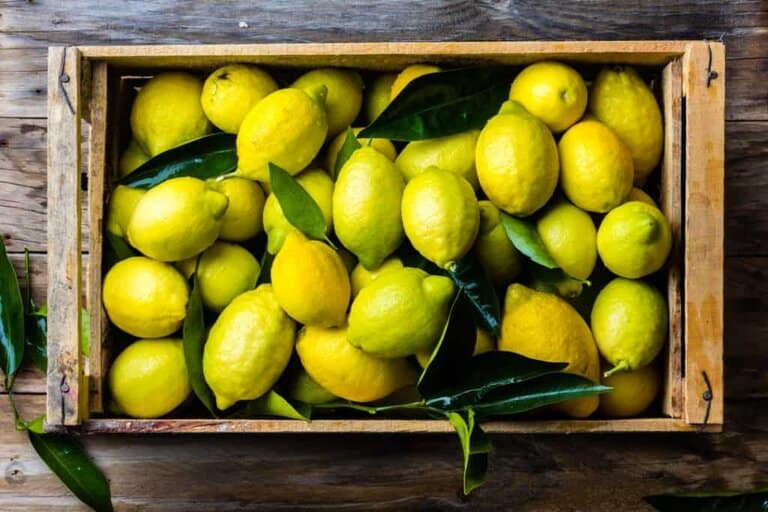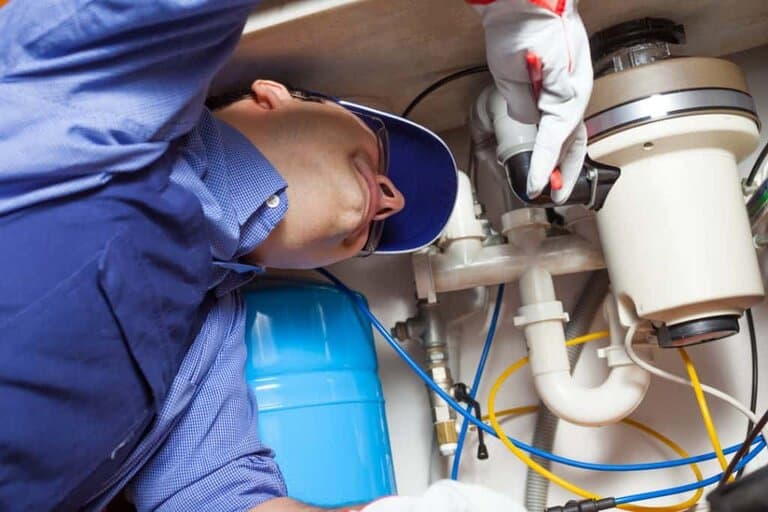You shouldn’t put lemons in the garbage disposal. Not only can the peel can clog up your disposal but the citric acid can damage your plumbing. While doing it once is unlikely to cause problems, frequently putting lemons in the garbage disposal is a bad idea.
Can you put lemons in the garbage disposal? Well, some say you can throw these in the garbage disposal while others say you shouldn’t. So what’s the real answer to the question?
While throwing them in every once in a while isn’t going to cause a major problem, there are some big reasons why throwing lemons in your garbage disposal isn’t a good idea.
But there are others who recommend it as it’s a natural way to get rid of bad odors and sanitize your disposal.
What’s the truth? Well, that’s what we’re here to find out. By the time you get to the end, you’ll have a clear idea of whether or not putting lemons in your garbage disposal is a good idea.

Can You Put Lemons in the Garbage Disposal?
First things first, having a garbage disposal beneath your kitchen sink is a huge advantage. It lets you dispose of the daily accumulated garbage without having to bother taking it out.
In just a snap, the garbage disposal can readily shred all small food waste and send it to the sewerage system.
But back to the lemon issue, can we put its peels in the disposal? Technically, it’s best to avoid throwing these in the garbage dispenser since they can cause a few issues.
That being said, if you dispose of them properly then you won’t have to worry about damaging your garbage disposal. Let’s find out more.
What Will Happen If You Do Not Put Lemons in There Properly?
If you’ve used numerous lemon pieces and decided to just casually toss them in the dispenser, you’ll have some problems.
If these peels accumulate, a full blockage can happen and the water will stop flowing through the disposal. This can lead to a big problem as large lemon peels stick easily to the blades unlike other types of waste.
Perhaps the bigger issue, however, is acid.

Acidity attacks
It’s common knowledge that lemons have a high acidic content. This can eventually damage plumbing materials which is why it’s best to accompany lemons with a strong flow of warm water.
Regularly using lemon juice for deodorizing can be dangerous to your disposal’s metal parts. That’s because the acid can easily make these corrode and deteriorate. When it happens, your garbage disposal won’t be able to function properly.
Running water can help reduce acidity levels and prevent damage and clogging.
So try to avoid throwing lemons into the disposal. If you really have to, make sure you don’t toss the whole or half lemons in there. If you want to use lemon juice for deodorizing, just use it occasionally and not constantly.
If you don’t use lemons often then putting them in your garbage disposal and washing it down with water isn’t going to cause any noticeable problems. If you are getting rid of lemons this way often, it can be a different story.
That citric acid sitting on your pipes for a long time will eventually wear away at them so we’d say that’s best to avoid putting lemons in your garbage disposal at all.
Getting rid of the odor
Generally, garbage disposals are extremely low-maintenance but can stink if there is a food build-up.
This is a reason why many like to use lemons. While doing this once or twice wouldn’t cause any noticeable damage, it’s not a great idea for the reasons mentioned above.
To eliminate foul odor, it’s best to use a natural solution to keep the disposal clean and fresh.
The best thing to try for getting rid of a bad smell is actually ice. That bad smell is often just from food scraps that are stuck on the blades or other parts of the disposal. Running ice through it will help to dislodge these scraps and remove their smell.
If that doesn’t work, then a baking soda and vinegar mixture will. Even though, like lemons, vinegar is acidic, the reaction with baking soda makes it a much more effective deodorizer and is a good option but not one you should do all the time.
What Should Never Enter A Garbage Disposal
Garbage disposals today have become an important addition to a lot of people’s homes. That’s because it offers a quick and clean way to get rid of food waste while keeping trash bags lighter. Plus, it also prevents landfills from overflowing
Another reason why these have become extremely popular among many is because of their solid build and easy-to-use system.
But despite how tough and durable they may be, garbage disposals are still vulnerable and can “choke” on some items.
With that, we’re also sharing some of the things that you should never put in your garbage disposal. Avoid these to ensure that it runs smoothly while keeping your drain clog-free.
Big bones and seafood shells
Garbage disposals have grinders, but these aren’t designed to grind bones. However, they’re sturdy enough to grind small bones. So don’t worry if you accidentally drop a chicken wing or a fishbone since these won’t cause problems.
But of course, don’t expect your garbage disposal to grind a rack of ribs.
Other than bones, you should also avoid throwing in seafood shells. Whether it’s oysters, clams, lobsters, or mussels, these can damage the disposal’s blades, so you’d want to avoid these.
Coffee grounds
Coffee grounds really help reduce odor quickly, but these can cause more serious problems when thrown in your disposal. These reduce into a dense and thick lump of paste which ends up blocking the drain.
Paint
A little paint going down the drain won’t be a problem if it’s heavily diluted. But oil paint or latex should never go into your garbage disposal. These can sit in pipes and then eventually cure and harden.
To avoid clogging the disposal with this paint, clean brushes in appropriate containers and dispose of bulk paint properly.
Onion Skin
Whether it’s diced, chopped, or in chunks, regular onion waste will not be a problem for your disposal. The problem is with the thin membrane just below the outermost dry layer. It’s often removed from the onion before chopping, and it’s thrown into the disposal.
Since that wet layer is extremely thin, it can pass through the disposal and miss the blades easily. As a result, the skin winds up wedged in the drain and ends up trapping other food wastes which will eventually clog the disposal.
Pasta, Potatoes, Beans, and Rice
Starchy food like these quickly expand with water. That’s why even in small amounts, potatoes, pasta, rice, and beans can cause clogging. To keep your garbage disposal running smoothly, avoid throwing these in it.
But don’t worry if you cleaned a few scraps of these foods off of a plate. Just run the water for 30 seconds then it will flush through the trap and into the main line.
FAQs on Can You Put Lemons In The Garbage Disposal
If I throw lemon pieces in the disposal, how should I do it properly?
If you need to throw lemons in the disposal, cut them into small pieces. Then, dispose of these ones by one or in very small batches. Don’t toss everything in at once to avoid clogging.
What should I use to deodorize my garbage disposal?
Running ice through your disposal is the best method to try. If that doesn’t work, a baking soda and vinegar solution is very effective. Pour 1/4 cup of baking soda in it, then follow it with a cup of white vinegar.
Do lemons really clean a garbage disposal?
Lemons don’t help in cleaning the disposal. They’re good for deodorizing but other solutions are more effective and less damaging to your garbage disposal.